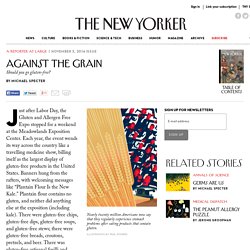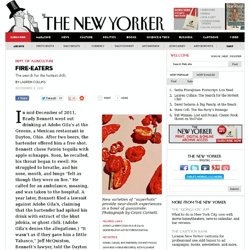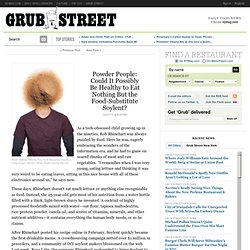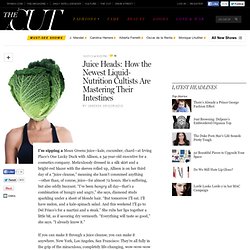

What’s So Bad About Gluten? Just after Labor Day, the Gluten and Allergen Free Expo stopped for a weekend at the Meadowlands Exposition Center.

Each year, the event wends its way across the country like a travelling medicine show, billing itself as the largest display of gluten-free products in the United States. Banners hung from the rafters, with welcoming messages like “Plantain Flour Is the New Kale.” Why Some Jews Don't Feel Guilty About Eating Pork. Tamar Adler grew up in a highly observant Jewish family who kept a kosher home.

But that didn’t keep her from what is still considered the most taboo food in Jewish culture: pork. She gravitated toward the meat from a very young age: As a picky four-year-old, Adler once wandered off to a neighbor’s house, only to be found by her mother happily devouring a pork chop. Today the writer and chef takes that love even further. “I think milk-braised pork is just God’s food,” Adler says of her favorite preparation, a combination that at first glance seems “radically unkosher” to even a Jewish pork lover like Michael Pollan. “Pork is just such an ecologically and financially smart thing for us to eat,” she says. Adler and Pollan act as standard-bearers for a growing tribe of progressive American — not to mention Israeli — Jews now unburdened by the ancient pork prohibition that so dogged their ancestors.
A good reason to eat pork: the taste. “Is your food healing the world or harming it? Lauren Collins: The Search for the Hottest Chili. In mid-December of 2011, Brady Bennett went out drinking at Adobe Gila’s at the Greene, a Mexican restaurant in Dayton, Ohio.

After two beers, the bartender offered him a free shot. Bennett chose Patrón tequila with apple schnapps. Soon, he recalled, his throat began to swell. He struggled to breathe, and his nose, mouth, and lungs “felt as though they were on fire.” He called for an ambulance, moaning, and was taken to the hospital. “Chili pepper” is a confusing term, another of Christopher Columbus’s deathless misnomers. Unis dans le profit. Sport et malbouffe sont souvent associés, comme s'il n'y avait pas là d'ironie.

En 2010, 79 % des aliments dont les 100 athlètes les plus influents aux États-Unis faisaient la promotion étaient forts en calories et faibles en nutriments, selon une étude de l'Université Yale. Bref, de la malbouffe. Et 93 % des boissons que ces sportifs annonçaient devaient toutes leurs calories au sucre ajouté. «Les trois principaux aliments appuyés par les athlètes sont les boissons sportives [qui sont aussi sucrées que les boissons gazeuses], les sodas comme le Coke, puis la malbouffe, dit Marie A. Bragg, l'une des auteures de l'étude publiée dans Pediatrics en 2013.
«C'est vraiment contradictoire, observe Corinne Voyer, directrice de la Coalition poids. Si ces unions improbables sont consommées, «c'est parce que le sport génère des émotions positives, indique André Richelieu, professeur au département de marketing de l'Université Laval. Lucky Charms olympiques Même message chez McDonald's. Powder People: Could It Possibly Be Healthy to Eat Nothing But the Food-Substitute Soylent? Photo: Bobby Doherty/New York Magazine (Powder); Getty Images (Body); Photo-illustration by Darrow As a tech-obsessed child growing up in the nineties, Rob Rhinehart was always puzzled by food.

Here he was, eagerly embracing the wonders of the information era, and he had to gnaw on seared chunks of meat and raw vegetables. “I remember when I was very young, eating lettuce and thinking it was very weird to be eating leaves, sitting in this nice house with all of these electronics around us,” he says now. These days, Rhinehart doesn’t eat much lettuce or anything else recognizable as food. Juice Heads: How the Newest Liquid-Nutrition Cultists Are Mastering Their Intestines. I’m sipping a Mean Greens juice—kale, cucumber, chard—at Irving Place’s One Lucky Duck with Allison, a 34-year-old executive for a cosmetics company.

Meticulously dressed in a silk skirt and a bright-red blazer with the sleeves rolled up, Allison is on her third day of a “juice cleanse,” meaning she hasn’t consumed anything—other than, of course, juice—for almost 72 hours. She’s suffering, but also oddly buoyant. “I’ve been hangry all day—that’s a combination of hungry and angry,” she says, diamond studs sparkling under a sheet of blonde hair. “But tomorrow I’ll eat. I’ll have melon, and a kale-spinach salad. If you can make it through a juice cleanse, you can make it anywhere. Wine-tasting: it's junk science. Every year Robert Hodgson selects the finest wines from his small California winery and puts them into competitions around the state.

And in most years, the results are surprisingly inconsistent: some whites rated as gold medallists in one contest do badly in another. Reds adored by some panels are dismissed by others. Over the decades Hodgson, a softly spoken retired oceanographer, became curious. Judging wines is by its nature subjective, but the awards appeared to be handed out at random. So drawing on his background in statistics, Hodgson approached the organisers of the California State Fair wine competition, the oldest contest of its kind in North America, and proposed an experiment for their annual June tasting sessions.
Each panel of four judges would be presented with their usual "flight" of samples to sniff, sip and slurp. The first experiment took place in 2005. "Chance has a great deal to do with the awards that wines win. " These judges are not amateurs either. L'"affaire Findus" effraie les consommateurs. Une réunion de crise devait se tenir à Bercy, lundi 11 février, pour envisager un renforcement des contrôles.

LE MONDE | • Mis à jour le | Par Mirel Bran (à Bucarest) et Laurence Girard La présence de viande de cheval dans des plats cuisinés censés contenir du bœuf fait scandale.